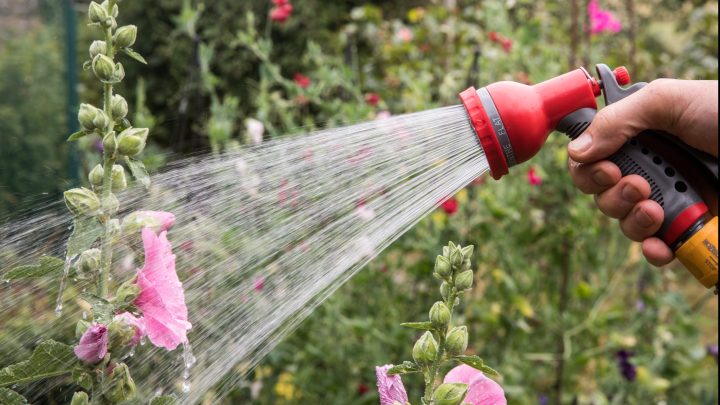
Why this plant nursery drives cross-country to hand-deliver orders: “There’s not a lot of wiggle room”
Why this plant nursery drives cross-country to hand-deliver orders: “There’s not a lot of wiggle room”

With rising freight rates and delayed deliveries, some small businesses are taking on unconventional measures to create their own supply chain solutions.
Elizabeth Dunham is vice president of Knight Hollow Nursery in Middleton, Wisconsin, which specializes in propagations of high-value ornamental trees, shrubs and fruit crops. Dunham said shipping was particularly tricky with fragile live products. Each pallet of plants can value up to thousands of dollars.
“Instead of relying on FedEx or UPS, we decided that we’re going to rent a truck this year, and we’re going to send an employee out because then we know it’s going to get there,” Dunham said.
Dunham spoke to “Marketplace” host Amy Scott about her workaround for the supply chain tie-ups causing unforeseen challenges.
The following is a transcript of their conversation.
Amy Scott: So, how is the nursery business doing during this pandemic? Plants have been pretty popular, judging from my social media feeds.
Elizabeth Dunham: Yeah, that’s right. Our nursery has done really well through this pandemic. I think people are sitting at home and looking out their window and saying, “Boy, you know, we could really use another tree or shrub or, you know, a vegetable or something in this garden that we have so much more time to play in.”
Scott: Yes. And yet, there’s this other big issue going on for many businesses: supply chain problems. What have you had trouble getting, and how has that affected your ability to get your product out to customers?
Dunham: We have had some problems getting pots — anything plastic is a problem — or chemicals can be hard to source, lately. However, our main problem has been logistics as far as shipping our plants out.
Scott: Yeah, tell me about that. Is it hard to and more expensive to ship these days?
Dunham: It’s definitely more expensive, and we are trying to ship more in bulk so that it’s more cost-effective for our customers. However, that makes it kind of cutthroat when it comes to actually shipping a huge amount of product all at once, especially for a live product.
Scott: And talk about what happens to a live product. I mean, how long do you have? How much wiggle room in delays do you have before the plants just die?
Dunham: Right. There’s not a lot of wiggle room. We have a lot of customers in Oregon, and we’re in Wisconsin, so you’re looking at a three- to four-day ship time as it is. And last year, we had a couple pallets that got out to the West Coast within a reasonable time, but they get loaded on the truck for delivery, and the FedEx employee wouldn’t come in, so our plants sat on the truck over the weekend and we lost a fair amount of product. We also had a pallet going out to New Jersey, and it ended up going rail because they didn’t have any trucks to ship the plants that way. The car got to New Jersey within a week, or something, and they didn’t have anybody to actually unload the product from the rail car, so it sat on the car for two weeks and it was all dead, of course.
Scott: It just hurts to think of all those dead plants, having killed a few myself, unintentionally.
Dunham: Yeah, we’re good at that, too. Just try not to.
Scott: Do you just get over that, as someone who does this professionally?
Dunham: You do. And I always say it’s nice to work with plants because they don’t talk back. I mean, you can see them if they’re hurting, but they don’t actually yell at you.
Scott: So the pandemic has been all about pivoting for small businesses, sometimes pivoting multiple ways. What solutions have you come up with to deal with the shipping issues?
Dunham: Right. So normally, we would plan our scheduling for our production of plants, and then we’d sort of piecemeal those out as they become ready. However, this year, we’ve had to grow all these different plants at the same time for our West Coast customers, and instead of relying on FedEx or UPS, we decided that we’re going to rent a truck this year, and we’re going to send an employee out, because then we know it’s going to get there. We know that they’re going to be in good care, and he’s going to take them out and deliver them all around the Portland area. That’s a huge pivot for us, and we normally we wouldn’t do that.
Scott: That’s quite a road trip. How many plants are we talking about?
Dunham: Well, we’re talking somewhere around 50,000 plants. So it’s a huge value for the company for us to get them delivered on time. There’s no way that I can rely on the other freight companies to do that. For right now, we’re just going to take it into our own hands and drive it out there ourselves.
There’s a lot happening in the world. Through it all, Marketplace is here for you.
You rely on Marketplace to break down the world’s events and tell you how it affects you in a fact-based, approachable way. We rely on your financial support to keep making that possible.
Your donation today powers the independent journalism that you rely on. For just $5/month, you can help sustain Marketplace so we can keep reporting on the things that matter to you.











